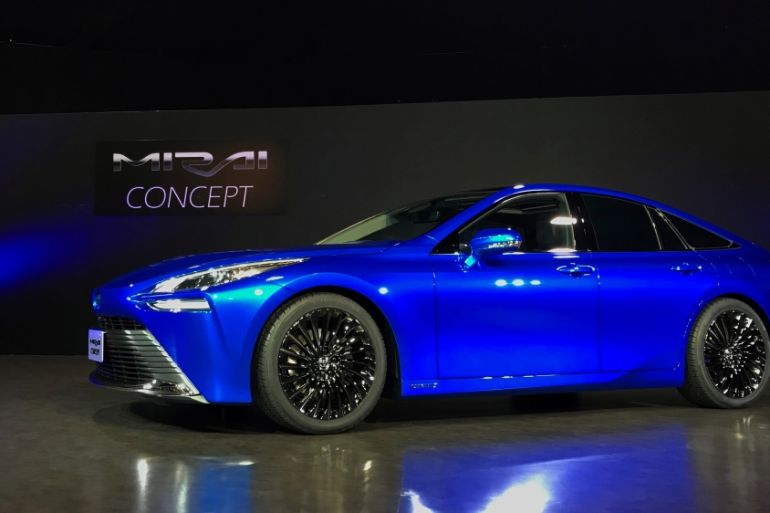Hydrogen power: Toyota takes on Tesla with alternative fuel
Hydrogen fuel cell motors have yet to make a dent in the market for clean energy cars.

Japan‘s biggest carmaker, Toyota Motor Corp, has unveiled a redesigned hydrogen-power fuel cell car in a bid to revive demand for technology that aims to compete with the rise of California-based Tesla Inc.
On Friday, Toyota displayed a prototype of its completely revamped fuel cell sedan, the Mirai, which is built on the same platform as its luxury Lexus brand’s LS coupe.
Keep reading
list of 4 itemsCould shipping containers be the answer to Ghana’s housing crisis?
Are Chinese electric vehicles taking over the world?
First pig kidney in a human: Is this the future of transplants?
The carmaker has been developing fuel-cell vehicles for more than 20 years, but the technology has been eclipsed by the rapid rise of rival battery-powered electric vehicles promoted by the likes of Tesla Inc.
Fuel cells split hydrogen molecules to create an electric current that can power a motor. The only byproduct of the process is water, making such systems far cleaner for the environment than traditional engines that burn fossil fuels. Their biggest drawbacks are that hydrogen refuelling stations are rare and the gas is highly combustible.
Electric cars like Teslas use lithium-ion batteries similar to those found in smartphones and laptops. They need recharging, which can take longer than refilling a fuel cell car with hydrogen, but do not carry around an explosive gas.
Unveiled in the run-up to the Tokyo Motor Show starting on October 24, the new Mirai model boasts a longer driving range than its predecessor and completely redesigned fuel cell stack and hydrogen tanks, the company said.
“We wanted to make a car that people really want to buy, not just because it’s an eco car,” Yoshikazu Tanaka, chief engineer of the new Mirai, said at the unveiling.
“We wanted something that’s fun to drive.”
Its sporty redesign with longer wheelbase and lower-slung chassis is a marked departure from the first-generation Mirai, which looks like a bulked-up Prius hybrid.
The new car also has a 30 percent improved driving range over the previous iteration’s approximately 700 kilometres (435 miles), according to the company.
Tanaka said the latest Mirai would cost less to make than its predecessor, because of a shift to mass production. The current model is mostly assembled by hand.
Costing consumers about five million yen ($46,500) after subsidies in Japan, the original Mirai is one of three fuel cell cars available to consumers. Hyundai Motor Co sells the Nexo, while Honda Motor Co Ltd leases out the Clarity.
Toyota has sold fewer than 10,000 of the Mirai, a fuel cell sedan it touted as a game-changer at its launch five years ago. By contrast, Tesla sold 25,000 of its battery-powered Model S sedans – which start at $71,000 in the United States – in its first year and a half.
The disappointing sales of the Mirai reflect insufficient refuelling stations, consumer worries about resale values and concerns over the risk of hydrogen explosions. A hydrogen tank blast in South Korea that killed two in May was followed by another at a Norway hydrogen station in June.
Toyota declined to disclose a price for the new model and said it would be available from late next year in Japan, North America and Europe.